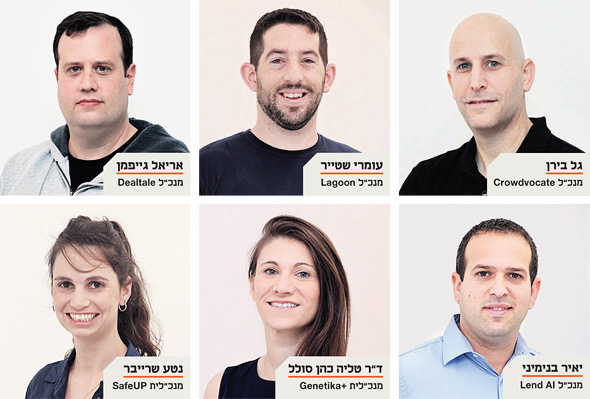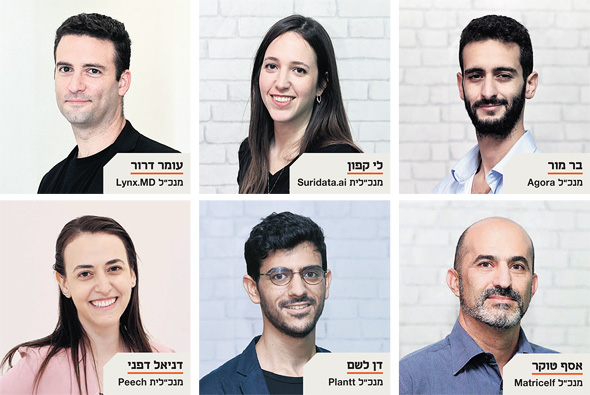Startup+ Competition: These startups create innovative products for everyday use
Reducing the risk of bodies’ rejecting implants, easy-to-use information about real estate data, and a support network for abused women are just some of the tech solutions featured in Calcalist’s Startup+ competition that can be used every day
16:4214.12.20
Fifteen companies advanced to the semifinals of Calcalist’s and Bank Hapoalim High-Tech’s StartUp+ competition and will face off for a spot in the finals. A representative from each company gave its 3-minute pitch presenting their solutions, and afterward answered judges' questions. Batsheva Moshe, Head of Poalim High-Tech at Bank Hapoalim spoke at the event.
The judges’ panel consisted of Eti Ben-Zeev - CIO, Head of Information Technology at Bank Hapoalim; Natalie Refuah, Partner at Viola Growth; Emanuel Timor, General Partner at Vertex Ventures; Sigalit Klimovsky, Partner at Grove Ventures; Ayal Itzkovich, Pitango managing partner; Yuval Cohen, Founder & Managing Partner of StageOne Ventures; Netalie Nadivi, Partner at Triventures; Nofar Amikam, Partner at Glilot Capital Partners; and Rotem Eldar, Managing partner at 10D.

The contestants who reached the semifinals
This week the judges will choose five companies, who will be invited to attend the finale, which will take place on Dec. 24, where contestants will be analyzed again, and the most innovative startup of 2020 will be chosen. First and second-place winners will receive monetary prizes and hours of professional consulting, publication in “Calcalist Digital,” office hours at a collaborative mixed workspace, and more. These are the 15 semifinalists:
Agora
Managing real estate investments
The company developed a system to manage private investments in real estate. Some of the young investors in the company include Ran Sarig and Efi Cohen, the founders of Datorama, Sarit Firon, a manager of the venture capital fund Fusion LA, Doron Myersdorf, CEO of StoreDot, and Hanon Mor from the Hanan Mor Holdings Group and Team8.
Lightspin
Cloud infrastructure protection
The company, which recently raised a seed investment of $4 million, developed a technology that is able to assist organizations to protect their cloud infrastructure and to increase the process of digitally transferring data. Cloud technologies continue to develop at a fast rate and allow for innovations and advanced business capabilities, but this accompanies new challenges for data security teams, who deal with a lack of resources and experience along with a great volume of alerts without effective prioritization. As cloud technology becomes more dynamic, additional teams will be needed to update and protect the system’s abilities. Those conditions can occasionally lead to visibility decentralization and loss of control over cloud infrastructure. This can leave organizations vulnerable to malicious attacks due to the growing weak spots in the software.
Suridata.ai
Reading and understanding text
The company developed a system that is based on artificial intelligence from the field of natural language processing (NLP), which mimics the human ability to read and comprehend texts and their meaning. The unique technology allows organizations to easily locate, identify, and categorize sensitive information for their organizations without human interference or hand-typed processes. The system connects in a simple and seamless way to data sources in the organization, scans and analyzes the data, while spotting similar sensitive information to allow the organization to control and protect its data.
Lynx.MD
Easy access to medical information
The company, which was founded in 2018 by Omer Dror, Ofir Farchy, and Dr. Robert Eisdorfer, developed a SaaS platform that allows health organizations to take advantage of the medical data it collects over time and to access it in a safe way, and while protecting patient privacy, to develop new drugs, medical devices, and diagnostic testing based on artificial intelligence. In this way, it shortens the long process for awaiting FDA approval by basing its findings on real-world evidence. The company is working on a number of different hospitals in Israel and the U.S. and is in advanced stages with a number of health centers in Israel and around the world.
With its help, health organizations can share many types of information (including tabular information, such as tests and procedures, as well as videos, images, and genetic information) with external companies, while the data remains in complete control of health bodies. The company employs 12 people today, most of who have come from the R&D sector.

The contestants who reached the semifinals
Plant
Effective customer service
The company, founded in 2019 by Dan Leshem and Itamar Isaac (from OrCam), helps companies improve their customer service and user experiences. The technology analyzes previous conversations of the company with its customers and creates a behavioral pattern of users to spot bottleneck issues and common customer issues. Through its exact mapping of customer experiences, companies can spot a customer’s needs in real-time, provide them with helpful, automatic, and proactive service, while saving time, and increasing sales. It employs 10 people, most of whom are based in Tel Aviv.
Matricelf
Tissue and organ implants
The biotechnology company, which was founded in 2019 based on a technology that was developed at Tel Aviv University, is active in the field of regenerative medicine and tissue engineering. The company is developing a platform to produce implants by using 3D printing to create otological implants of tissues and organs. The implants are built from a matrix of cells that are taken from the implantee’s body, which lowers the risk of the body rejecting the implant. The implants yielded good paraclinical results in a variety of diseases such as Myocardial infarctions and Parkinson's disease. The company’s technology has been used to 3D print the first artificial heart in history. The company is developing motor implants for patients who are paralyzed or have spinal cord injuries and is planning its first experiment on humans for 2023. It currently employs seven people.
Gina Life Diagnostics
Early detection of cancer
The company, which launched in January of this year, is developing technology in the field of women’s health, for the early detection of ovarian cancer. Potential customers are women who are at increased risk of ovarian cancer, like those who carry the gene mutation of BRCA-1 or BRCA-2, women with a history of ovarian, breast, colon, and pancreatic cancers as well as post-menopausal women. The company employs two people.
Peech
Automatic video production
The company, which was founded in May this year by Danielle Dafni and Johnathan Kanarek, has developed a fully-automated video creation tool. Previously, Kanarek was at Kaltura and became Peech’s CTO. The two co-founders are video professionals and have combined their knowledge of video editing and video streaming content to the cloud. The company participated in WOSNA, the women’s accelerator of Startup Nation.
Lagoon
Providing information about investments
The company, which was founded in February this year, has developed a non-coded platform for professional investors that allows them to access information about investments and future options. It already has a few customers, including a U.S. hedge fund that invests in real estate as well as three pilot ones in Israel, on in the U.S., and one in Singapore. The company is active in Tel Aviv and employs six employees and four advisers.
Appwrite
An open-source code for organizations
The company was founded in October 2019 as a complete open-source code that is designed mainly for independent developers, but with further improvements, it plans to be available for organizational use too. The product has a following of 4,500 developers around the world and is constantly growing. The open-source code project has more than 200 code contributors, and many help to expand its knowledge base through writing posts, video tutorials, and even a book. The company completed its first financing round, has two employees, and employs additional external contractors.

The contestants who reached the semifinals
Crowdvocate
Support for sales systems
The company which was established in January 2018, developed a platform that helps B2B companies scale customer advocacy and references. By engaging customers post-sale Crowdvocate builds customer insights and creates journey based advocacy. Crowdvocate customers include enterprise tech companies and the company has seen 300% growth since the beginning of the year.
LendAI
Easy access to real estate data
The company was founded in 2019 and developed a solution that deals with problems in the process of real estate investments in the U.S., starting with customs, business deals, loans, signing for and managing loans, and taxes throughout the mortgage. The company employs eight people who work full-time, and is currently recruiting additional employees. It works using the B2B2C model and today has over 40 active partners in the market in 12 countries, including the U.S. representing thousands of potential customers. It is currently active with a paying customer-base.
Dealtale
Analyzing customer information
The company was founded this year and allows market, sales, and support teams to analyze their figures at the customer level using a large amount of data sources without the need to write code. The company provides a solution for situations in which customers are spread out on different platforms, like CRM, in different marketing and publication teams, in system support, and more. It draws data from systems and allows it to be analyzed by contacting the customer easily and quickly, without the need for technical knowledge. The company employs four people.
Genetika+
Finding the right drugs for patients suffering from depression
The company was launched in 2018 by Talia Cohen and Daphna Laifenfeld, who have several years of experience in developing and selling personalized drug technologies in order to find the best treatment options for patients suffering from depression. The company's potential customers are health organizations, including hospitals, doctors, insurance companies, and sick patients, as well as pharma companies that are developing new drugs to combat depression and can take advantage of their quick tests to speed up new medications’ clinical trials. The company employs seven people full-time and is located in Jerusalem.
SafeUP
An international campaign to assist abused women
The company provides a safety network for abused women using an application where 10,000 Israeli women ‘guardians’ are available at anytime and anyplace to help ensure the personal safety of abused women and prevent violence from being used against women. When a user feels threatened she can call upon three nearby guardians who support her by video, and can either physically come to her location or be accompanied by police to find a solution and return her to a safe zone. The company employs six people, five of whom are professionals, and 22 volunteers. The company’s clients include the Tel Aviv and the Yeruham municipalities.



